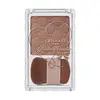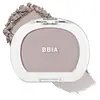What's inside
What's inside
 Key Ingredients
Key Ingredients

 Benefits
Benefits

 Concerns
Concerns

 Ingredients Side-by-side
Ingredients Side-by-side

Talc
AbrasiveSynthetic Fluorphlogopite
Squalane
EmollientNylon-12
Silica
AbrasiveDimethicone
EmollientDiisostearyl Malate
EmollientPhytosteryl/Isostearyl/Cetyl/Stearyl/Behenyl Dimer Dilinoleate
Skin ConditioningPhytosteryl/Octyldodecyl Lauroyl Glutamate
Skin ConditioningDipentaerythrityl Hexahydroxystearate/Hexastearate/Hexarosinate
Skin ConditioningMethicone
EmollientPerfluorooctyl Triethoxysilane
Aluminum Hydroxide
EmollientHydrogen Dimethicone
Tocopherol
AntioxidantButylparaben
MaskingMethylparaben
PreservativeWater
Skin ConditioningButylene Glycol
HumectantPueraria Lobata Root Extract
HumectantCitrus Limon Fruit Extract
MaskingEquisetum Arvense Extract
AstringentHumulus Lupulus Extract
AntimicrobialPinus Sylvestris Cone Extract
MaskingRosmarinus Officinalis Extract
AntimicrobialAloe Barbadensis Leaf Extract
EmollientChlorella Vulgaris Extract
Skin ConditioningIron Oxides
Mica
Cosmetic ColorantCI 77891
Cosmetic ColorantCI 77007
Cosmetic ColorantTalc, Synthetic Fluorphlogopite, Squalane, Nylon-12, Silica, Dimethicone, Diisostearyl Malate, Phytosteryl/Isostearyl/Cetyl/Stearyl/Behenyl Dimer Dilinoleate, Phytosteryl/Octyldodecyl Lauroyl Glutamate, Dipentaerythrityl Hexahydroxystearate/Hexastearate/Hexarosinate, Methicone, Perfluorooctyl Triethoxysilane, Aluminum Hydroxide, Hydrogen Dimethicone, Tocopherol, Butylparaben, Methylparaben, Water, Butylene Glycol, Pueraria Lobata Root Extract, Citrus Limon Fruit Extract, Equisetum Arvense Extract, Humulus Lupulus Extract, Pinus Sylvestris Cone Extract, Rosmarinus Officinalis Extract, Aloe Barbadensis Leaf Extract, Chlorella Vulgaris Extract, Iron Oxides, Mica, CI 77891, CI 77007
Talc
AbrasiveSynthetic Fluorphlogopite
Polymethylsilsesquioxane
Silica
AbrasiveDimethicone
EmollientTriethoxycaprylylsilane
Zinc Stearate
Cosmetic ColorantPhenyl Trimethicone
Skin ConditioningCaprylic/Capric Triglyceride
MaskingCI 77499
Cosmetic ColorantTocopheryl Acetate
AntioxidantCaprylyl Glycol
Emollient1,2-Hexanediol
Skin ConditioningCI 77491
Cosmetic ColorantParfum
MaskingCI 77492
Cosmetic ColorantAluminum Hydroxide
EmollientCI 15850
Cosmetic ColorantAlternatives
Ingredients Explained
These ingredients are found in both products.
Ingredients higher up in an ingredient list are typically present in a larger amount.
Aluminum Hydroxide is a form of aluminum. It can be naturally found in nature as the mineral gibbsite. In cosmetics, Aluminum Hydroxide is used as a colorant, pH adjuster, and absorbent.
As a colorant, Aluminum Hydroxide may add opacity, or reduce the transparency. Aluminum hydroxide is contains both basic and acidic properties.
According to manufacturers, this ingredient is an emollient and humectant. This means it helps hydrate the skin.
In medicine, this ingredient is used to help relieve heartburn and help heal ulcers.
There is currently no credible scientific evidence linking aluminum hydroxide in cosmetics to increased cancer risk.
Major health organizations allow the use of aluminum hydroxide in personal care products and have not flagged it as a carcinogenic risk at typical usage levels.
Learn more about Aluminum HydroxideDimethicone is a type of synthetic silicone created from natural materials such as quartz.
What it does:
Dimethicone comes in different viscosities:
Depending on the viscosity, dimethicone has different properties.
Ingredients lists don't always show which type is used, so we recommend reaching out to the brand if you have questions about the viscosity.
This ingredient is unlikely to cause irritation because it does not get absorbed into skin. However, people with silicone allergies should be careful about using this ingredient.
Note: Dimethicone may contribute to pilling. This is because it is not oil or water soluble, so pilling may occur when layered with products. When mixed with heavy oils in a formula, the outcome is also quite greasy.
Learn more about DimethiconeSilica, also known as silicon dioxide, is a naturally occurring mineral. It is used as a fine, spherical, and porous powder in cosmetics.
Though it has exfoliant properties, the function of silica varies depending on the product.
The unique structure of silica enhances the spreadability and adds smoothness, making it a great texture enhancer.
It is also used as an active carrier, emulsifier, and mattifier due to its ability to absorb excess oil.
In some products, tiny microneedles called spicules are made from silica or hydrolyzed sponge. When you rub them in, they lightly polish away dead skin layers and enhance the penetration of active ingredients.
Learn more about SilicaSynthetic Fluorphlogopite is the synthethic version of mica. It consists of fluorine, aluminum and silicate.
Synthetic Fluorphlogopite is used to add volume to products.
It is considered non-irritating on the skin.
Learn more about Synthetic FluorphlogopiteTalc is a clay mineral. It helps absorb moisture and improve the texture of products. Like other types of clay, Talc can have a slight exfoliating effect on skin. Talc can be added to increase the volume of products.
Some Baby powders are made by combining talc with corn starch. The word "talc" comes from Latin and originates from Arabic. Talc is a mineral commonly found throughout the world.
If you have any concerns about using talc, we recommend checking out the FDA's official page.
Learn more about Talc